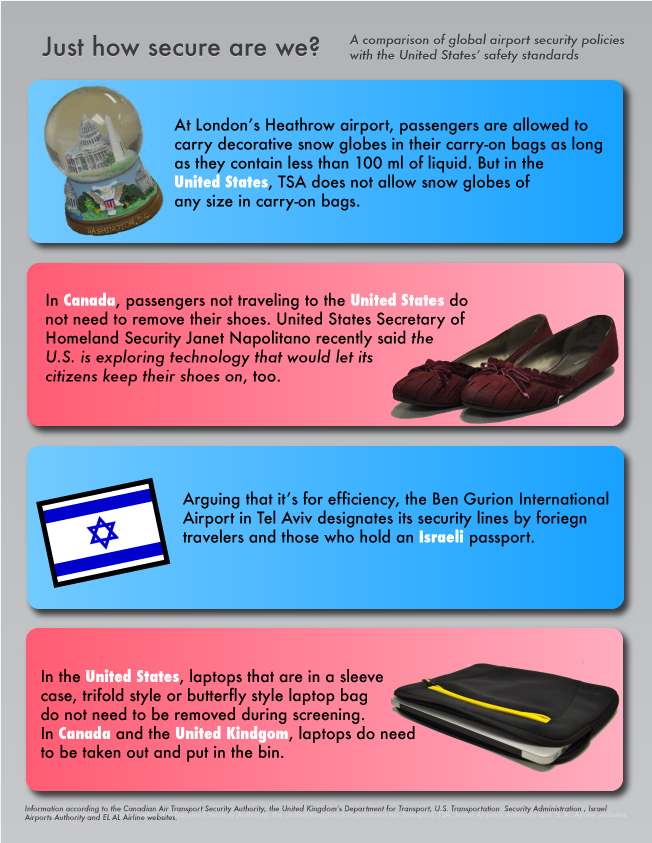WASHINGTON – Fly outside the United States and you’ll experience security regulations different than you would at Chicago’s O’Hare airport or New York’s LaGuardia.
 Wouldn’t uniform standards for airport security would be easier to deal with? What stands in the way?
Wouldn’t uniform standards for airport security would be easier to deal with? What stands in the way?
Simply, it’s because countries face different threats and handle attacks uniquely, and some value civil liberties more than others, said Rick “Ozzie” Nelson, director of the Homeland Security and Counterterrorism Program at the Center for Strategic and International Studies.
Immediately after Sept. 11, U.S. airport security policy was to treat “every person flying as a terrorist,” Nelson said.
Now the Transportation Security Administration, which controls airport security, is undergoing major changes in how it treats passengers. It just launched new pilot programs in four cities to move away from treating every passenger the same.
Snow globes, for example, are allowed in carry-on baggage for flights out of Heathrow airport in London as long as they have less than 100 milliliters of liquid, but not in the United States.
TSA spokesman Michael McCarthy said TSA agents can’t accurately determine the volume of the liquid contained in the tourism trinkets, so they must be either stowed in checked luggage or shipped home.
Following the airline-bombing plot targeting the United Kingdom and United States in August 2006, the TSA broadly banned all liquids. But, after research, TSA concluded that the small amounts of liquids passengers can bring on the planes with them today are not dangerous. On Sept. 26, 2006, TSA allowed travel-size liquids; baby formula, milk and juices; and medicines, McCarthy said.
In the last 10 years, passengers had to start bagging their liquids, taking off their shoes and jackets and enduring pat-downs. But critics have suggested that many of these policies are simply an act of political theater to make passengers believe they’re safer.
“This construct (of treating all passengers the same) has fueled inefficient policy and practice: the unrealistic expectation that the TSA must stop every terrorist threat has fostered policies that treat all members of the public as potential terrorists and, therefore, apply high level of screening to each and every passenger,” Nelson wrote in response to TSA’s announcement of new pilot programs.
But McCarthy said the TSA works closely with international partners to implement standards in security. The list of items passengers can’t fly with was developed shorty after Sept. 11, and continues to be modified using a “risk-based and intelligence-driven approach,” he said.
The new pre-screening initiative pilots in the Detroit, Atlanta, Miami and Dallas/Fort Worth airports will allow certain passengers the privilege of not removing their shoes and experiencing an expedited screening. But, some countries, such as Canada, don’t require passengers to remove their shoes unless they’re boarding a flight to the United States.
“(This will) continue to move the TSA in a more risk-based model that is going to be more effective and arguably more efficient,” Nelson said.
Each country approaches their security different. Israel, for example, faces more constant security threats and therefore has more time-consuming and rigorous airport screenings, he said.
Some passengers have criticized Israel’s overall policy for promoting racial profiling. Passengers in the United States would not tolerate more invasive practices, Nelson said, because Americans have a deep respect for their civil rights and privacy.
“We’re not going to strip-search everyone,” Nelson said.
But, that doesn’t mean the TSA is lenient. “TSA is in an incredibly difficult position. If they take a measure off and something happens, the TSA will be blamed that they didn’t do everything they could,” he added.
—
Graphic information according to the Canadian Air Transport Security Authority, the United Kingdom’s Department for Transport, the U.S. Transportation Security Administration, Israel Airports Authority and EL AL Airline websites.
